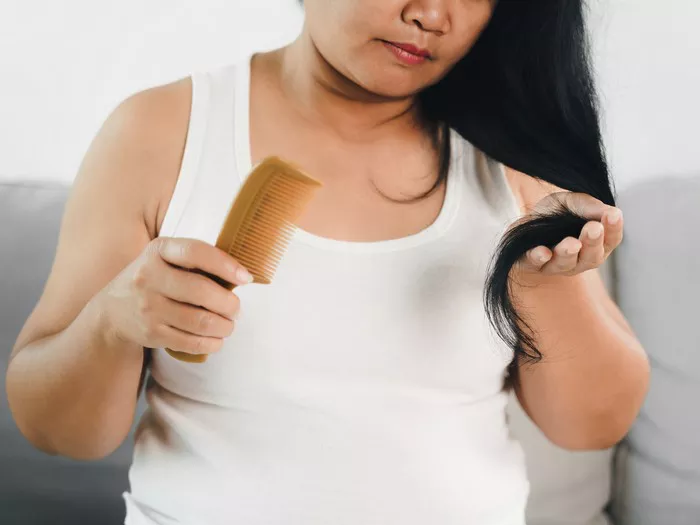Unraveling the Link Between PCOS and Hair Loss
Polycystic Ovary Syndrome (PCOS) is a common hormonal disorder affecting women of reproductive age. One of the lesser-known but impactful symptoms of PCOS is hair loss. This article aims to delve into the connection between PCOS and hair loss, exploring the causes, symptoms, and available management options.
1. Understanding PCOS and Its Impact on Hormones
1.1 Overview of Polycystic Ovary Syndrome
PCOS is a hormonal disorder characterized by imbalances in reproductive hormones, leading to various symptoms such as irregular periods, ovarian cysts, and changes in hormone levels. Elevated levels of androgens, commonly known as male hormones, play a crucial role in the manifestation of PCOS symptoms.
1.2 Key Points on Hormonal Imbalances in PCOS
a. Increased production of androgens like testosterone.
b. Insulin resistance, leading to elevated insulin levels.
c. Disruption of the normal menstrual cycle.
2. The Role of Androgens in Hair Follicle Sensitivity
2.1 Androgens and Hair Follicle Miniaturization
High levels of androgens affect the hair follicles, leading to a process known as miniaturization. This process involves the gradual shrinking of hair follicles, resulting in finer and shorter hair growth. Over time, affected follicles may cease to produce visible hair, causing thinning and eventual hair loss.
2.2 Key Points on Androgens and Hair Loss
a. Androgens affect the hair growth cycle.
b. Increased sensitivity of hair follicles to androgens.
c. Miniaturization leads to the production of finer and thinner hair.
3. Identifying Hair Loss Patterns in PCOS
3.1 Types of Hair Loss Associated with PCOS
Hair loss in PCOS can manifest in various patterns, including:
a. Androgenetic Alopecia (Female Pattern Baldness): Thinning on the crown with a widening part.
b. Diffuse Thinning: Generalized thinning across the scalp.
c. Frontal Fibrosing Alopecia: Receding hairline along the forehead.
3.2 Key Points on Hair Loss Patterns
a. PCOS-related hair loss often presents as a combination of these patterns.
b. Early identification allows for timely intervention and management.
4. Management and Treatment Options for PCOS-Related Hair Loss
4.1 Addressing Underlying Hormonal Imbalances
Managing hair loss in women with PCOS often involves addressing the underlying hormonal imbalances. This may include:
a. Hormonal Birth Control: Regulating menstrual cycles and reducing androgen levels.
b. Anti-Androgen Medications: Blocking the effects of androgens on hair follicles.
c. Insulin-Sensitizing Medications: Managing insulin resistance.
4.2 Lifestyle Changes and Hair Care Practices
a. Healthy Diet: Adopting a balanced diet to manage insulin levels.
b. Regular Exercise: Improving insulin sensitivity and overall health.
c. Stress Management: Reducing stress, which can exacerbate hair loss.
4.3 Topical Treatments and Hair Care Products
a. Minoxidil: Stimulating hair follicles and promoting hair growth.
b. Prescription Shampoos: Addressing underlying scalp conditions.
c. Low-Level Laser Therapy (LLLT): Stimulating hair follicles through light therapy.
FAQs: Answering Your Queries
Q1: Can hair loss due to PCOS be reversed?
A1: While complete reversal may not always be possible, timely management and treatment can often slow down or halt further hair loss. Some women may experience regrowth with appropriate interventions.
Q2: How long does it take to see results from PCOS-related hair loss treatments?
A2: Results vary among individuals. It may take several months to see noticeable improvements. Consistency with treatment and lifestyle changes is crucial for effectiveness.
Q3: Are there specific hairstyles recommended for women with PCOS-related hair loss?
A3: Opting for hairstyles that minimize tension on the hair, such as loose braids or ponytails, can help reduce stress on the follicles. Consulting with a hairstylist experienced in dealing with hair loss can provide personalized recommendations.
Q4: Can PCOS-related hair loss affect body hair as well?
A4: Yes, elevated androgen levels in PCOS can lead to increased body hair growth (hirsutism) in some areas while causing scalp hair loss. Addressing hormonal imbalances can help manage these symptoms.
Conclusion: Empowering Women with PCOS to Address Hair Loss
Hair loss in women with Polycystic Ovary Syndrome can be a distressing symptom, impacting both physical appearance and emotional well-being. Understanding the connection between PCOS and hair loss, along with proactive management, empowers women to address this aspect of the syndrome and regain confidence in their natural beauty. Early diagnosis, lifestyle modifications, and a holistic approach to treatment contribute to a comprehensive strategy for managing PCOS-related hair loss.

